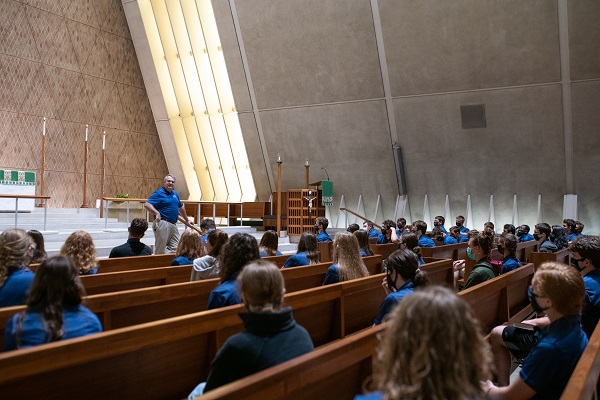
Christ Academy High School Begins


Concordia Theological Seminary, Fort Wayne
κήρυξον τὸν λόγον. Preach the Word.

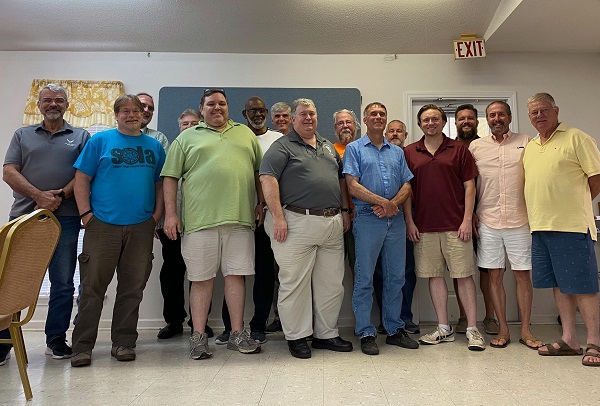
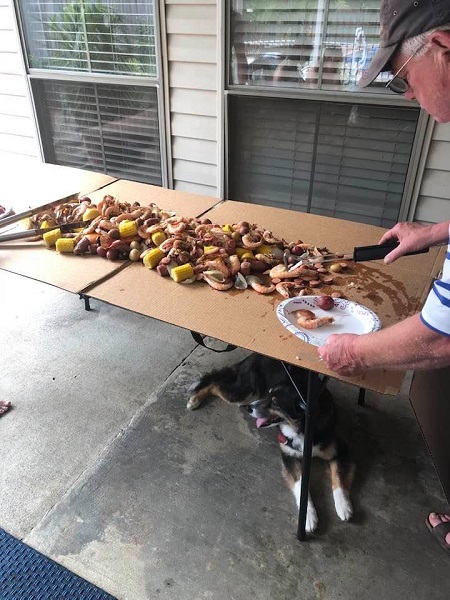 Pastors from Louisiana, Alabama, Florida, and Nebraska attended the course. This is Prof. Pless’s third time in Gonzales. In addition to daily instruction and, as per tradition, the pastors enjoyed a shrimp boil and a crab boil, hosted by Rev. Karl Hollibaugh of St. James. The class met from June 22-24.
Pastors from Louisiana, Alabama, Florida, and Nebraska attended the course. This is Prof. Pless’s third time in Gonzales. In addition to daily instruction and, as per tradition, the pastors enjoyed a shrimp boil and a crab boil, hosted by Rev. Karl Hollibaugh of St. James. The class met from June 22-24.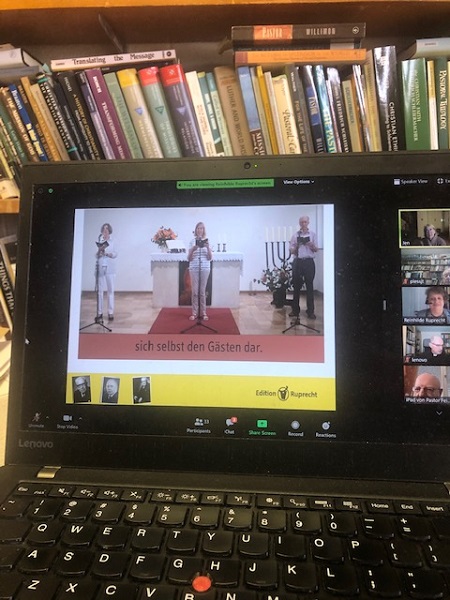
The LCMS Commission on Theology and Church Relations (CTCR) put together an addendum on Communion and COVID-19. It was written to address a document on online/home communion that has been circulating in the LCMS, endorsing communion at home through an online format (“Communion in Homes During Times of Crisis: Scriptural and Confessional Principles”). Four of our faculty members serve on the CTCR: Dr. Lawrence Rast Jr., President; Prof. John Pless, Assistant Professor of Pastoral Ministry and Missions; Dr. Naomichi Masaki, Professor of Systematic Theology; and Dr. James Bushur, The Carl and Erna Weinrich Associate Professor of New Testament and Early Church Studies. The addendum was written at the request of Dr. Matthew Harrison, President of the LCMS.
While the CTCR finds both common ground and empathy with their brothers in the ministry who seek to serve their people and congregations faithfully through online Communion (see, in particular, reason 1), they disagree with the conclusions that these brothers draw, fearing that, when practiced in such a way, the Sacrament raises doubts rather than strengthens faith.
From reason 2. It is the Lord’s Supper, not our supper:
The Sacrament of the Altar is not ours to do with it as we please. It is the Lord’s Supper and He is the true “officiant” since it is He who acts in the Words of Institution — and who instructs us regarding the proper use of His Supper.
“Our Lord Our Lord [sic] Jesus Christ, on the night when He was betrayed, took bread, and when He had given thanks, He broke it and gave it to the disciples and said: ‘Take, eat; this is My body, which is given for you. This do in remembrance of Me.’
“In the same way also He took the cup after supper, and when He had given thanks, He gave it to them, saying, ‘Drink of it, all of you; this cup is the new testament in My blood, which is shed for you for the forgiveness of sins. This do as often as you drink it, in remembrance of Me.’”
In these words, He calls us (His disciples) to repeat His holy meal (Do this) in His remembrance. He tells us what to do (taking bread and the cup of wine), what we are eating and drinking (His body and blood) and what we receive with it (forgiveness). The synoptic Gospels reinforce one another in these essential facts while St. Paul’s first epistle to the Corinthians corroborates them in the earliest church, showing both how they may be wrongly and rightly enacted…
“It is not a question of can one communion alone; rather, it is a question of should one commune alone.”* Similarly, the CTCR’s primary concern with online Communion is whether one can do it with certainty — whether it is a right use (“truly good, right and salutary”) of the Sacrament “according to Christ’s institution.”
Concern over right use is clearly evident in the Formula of Concord… These are matters of right use — the usus or actio that the Formula of Concord Solid Declaration discusses:
“In order to preserve this true Christian teaching on the Holy Supper and to avoid and eliminate many kinds of idolatrous abuses and perversions of this testament, this useful rule and guide is taken from the Words of Institution: nothing has the character of a sacrament apart from the use [usus] instituted by Christ or the divinely instituted action [actio]. (That is, when Christ’s institution is not observed as he established it, there is no sacrament.) This rule dare not be rejected in any way, but it can and should be followed and preserved in the church of God with great benefit. The usus or actio (that is, the practice or administration) does not refer primarily to faith or to the oral partaking, but to the entire external, visible administration of the Supper, as Christ established the administration of the Supper: the consecration, or Words of Institution, and the distribution and reception or oral partaking of the consecrated bread and wine, Christ’s body and blood. Apart from this practice it is not to be regarded as a sacrament — for example, when in the papistic Mass the bread is not distributed but is made into a sacrifice, or enclosed [in a tabernacle], or carried about in a procession, or displayed for adoration.”
This is very much pertinent to this conversation about online Communion. The “useful rule and guide” offered here is that “when Christ’s institution is not observed as he established it, there is no sacrament.” It has to do with “the entire external, visible administration of the Supper” and includes consecration, distribution and reception according to Christ’s institution.
And from reason 4. Emergency Baptism? Yes. Emergency Communion? No:
As we have noted, both Baptism and the Lord’s Supper have much in common. Both are instituted by Christ and depend entirely on the Gospel Word that empowers them and that defines their benefit — that both bestow forgiveness, life and salvation.
Yet, the different Means of Grace are also unique. The written Word can be disseminated in a variety of forms, while always retaining its character of divine inspiration and truth and offering throughout its pages the Gospel of salvation (e.g., John 5:39; Acts 17:1–2, 10–11; Rom. 1:1–3; 2 Tim. 3:16). The spoken Word of the Gospel, proclaimed individually by countless members of the royal priesthood and preached from pulpits as well as scattered abroad (“broadcast”) as far and wide as sound can be carried and without any restrictions on who would hear it, always retaining its character as the power of God for salvation (e.g., Matt. 13:3–9; Rom. 10:17; Luke 24:34). Baptism, administered always with water and always to a particular individual (even if thousands are baptized on the same day), retains its individual character as a means by which we receive discipleship, adoption, the Holy Spirit and new birth. And, in an emergency, any Christian baptizes (e.g., Matt. 3:11; 28:19; John 1:33; Acts 2:38–41; Rom. 6:3–4; Titus 3:5; 1 Peter 3:21).
So also, then, we receive the Lord’s Supper as a unique means of grace. It is not received by meditative reading alone, like the written Word. It is not scattered abroad, like the spoken Word. Unlike Baptism, it is not administered to the isolated individual except for when the pastor, who is called by the assembled church, carries the Sacrament on behalf of the assembly to the sick member. We value the Sacrament highly, but we restrict its administration rather than sharing it freely, having those with doubts and questions, visitors from other confessions and even our own children wait until they can share our confession (1 Cor. 1:10), examine themselves and rightly discern Christ’s body and blood. This is especially true in view of the sobering fact that the apostle’s instructions for the right use of the Supper contain a unique warning that its misuse can actually be harmful to the uninstructed and unprepared communicant both physically and spiritually (1 Cor. 11:27–32; see below under #5). Each of the Means of Grace is rightly used in a manner appropriate to it.
You can read the full 13-page addendum, positing ten reasons to question online Communion as good, right, and salutary by clicking here.
*Another resource is an unpublished paper written by Pr. Trevor Sutton (LCMS). His paper is “Making Sense of Online Communion: A Certain and Best Celebration of the Lord’s Supper,” dated January 17, 2020, available from the author.
Now that we’re a week out from perhaps the strangest graduation—and Spring Quarter—we’ve ever had in the nearly 175 year history of the Seminary, we asked Dr. Peter Scaer, Chairman and Professor of Exegetical Theology, to write up a piece reflecting on this time. We’re preparing to slowly open the campus over the summer, the plans for which we’ll post on Monday, but for today, as we go into the weekend, is this reflection on presence.
Here, in the Presence
By the Rev. Dr. Peter J. Scaer
Zoom fatigue is real, and online teaching just isn’t the same. The coronavirus has taught us quite a lot about the promise and pitfalls of technology. Certainly I have been grateful for video conferencing, emails, internet lectures, and all the rest. They have made it possible to continue our work of teaching the faith, reaching the lost, and caring for all. But they also remind us that this kind of living is not natural, that we were made for more.
I was one of the early advocates for online worship services, and was so grateful to pray and sing along as I logged onto Facebook. But, after a while, it does wear thin. We crave interaction and presence. A big part of seminary life is what we call the ungraded curriculum. This includes not only chapel together, where the voices of others make my voice stronger, but also coffee hour after chapel and Gemütlichkeit on Friday.
To be sure, we have had our share of online happy hours, but they’re never quite as happy as the real thing. While coffee hour leaves me invigorated, ready to get on with the work of studying and teaching, online gatherings often leave us flat, depleted of emotional energy. Apart from the body language of presence, it feels sometimes as if we are in a multi-person staring contest, and the awkward pauses are longer and more frequent.
So, we read the gospels and we see a ministry of presence. Christ is Emanuel, God with us. Not talking to us from a distance, but actually with us. Throughout His ministry, Christ ate and drank with His disciples, walked with them, and entered the boat as together they rowed to the other side. When Peter fell in the water, Jesus reached out with His hand. When our Lord came upon a leper, He touched him. When He saw a child, our Lord embraced him. And it went both ways. A woman reaches out to touch the hem of our Lord’s garment. A woman washes Jesus’ feet with her hair. Thomas wants the flesh and blood of Christ, the holes in His hands and feet. And at the Last Supper, the beloved disciple rests in the bosom of our Lord.
Technology is a blessing, yes, a wonderful supplement to all that we do, but it can never be a substitute for a potluck or pitch-in, or gathering together at the table of our Lord, eating real body and drinking real blood. Popular singers know this. Everyone needs a hand to hold onto.
We all need the human touch because we are flesh and blood human beings, created body and soul. We are not simply souls trapped in bodies; we live as embodied souls. To touch someone’s hand is not simply to touch their body—it is to touch the very person. In the early Church, there was the kiss of peace, perhaps not duplicated by the handshake of fellowship. But the lonely need a hug as much as a word. The elderly, the young, and all those in between need touch.
For the sake of safety, and in concern for our neighbor, we take precautions. Some wear masks, others not, but it must always be done so in love for others and to the glory of God, in a spirit of charity and understanding. But we can never get used to church online or a seminary that does not truly come together, body, soul, and mind, in the classroom, over coffee, at the cafeteria and chapel.
We don’t want symbols of Christ’s flesh and blood, we want the real thing. We are not content with emails, we want to talk face to face, to laugh and smile together. To comfort others in real and tangible ways, to enjoy the kind of human contact that comes naturally to us, as ones made for such things.
So pray for an end to the pandemic and pray that we can join together, replacing emoticons with real and interactive emotion, canned laughter with easy chuckles. Even more, pray that we soon come together, strengthened by each other’s singing, sitting, kneeling, and standing as one, truly together in our Lord’s presence.
Though online for this day and these times, soon we must come together to enjoy the fellowship of real presence, with each other, and with our Lord. More than an online chat, pray that we might soon be together in the house of our Lord.
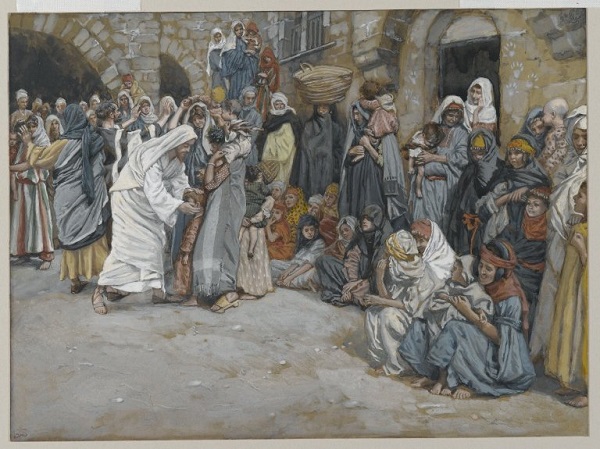
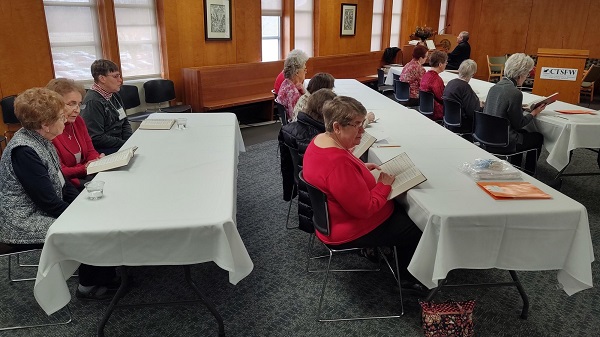
The Seminary Guild always breaks for January, but now that we’re into February and it’s the second Tuesday of the month, they’re back in business. Business this month is represented by the project-covered table in Luther Hall. Upcoming projects include: a $2,500 project goal to purchase a water bottle filling station (as requested by the students), a box for birthday skillet cookies, samples of handmade CTSFW t-shirts for the newborn babies, and a signup sheet for snacks during finals week. “We need 5 ladies to provide 50-60 servings each per day (Examples, cookies, brownies, Rice Krispies treats, fresh fruit & individually wrapped snacks of any kind — chips, candy, granola bars, etc.),” a handwritten note in the left-hand margin politely explains.
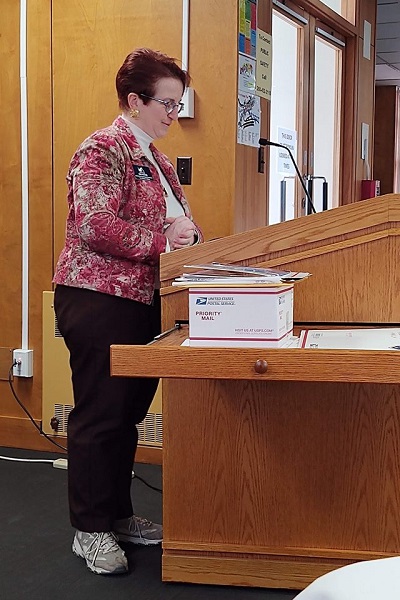
Today, the Guild invited Kim Hosier, Printing and Postal Services Manager, to speak on her vocation here at CTSFW. Kim has served at CTSFW since May of 1992; in a few short months she’ll have been here for 28 years. She started as bookstore secretary before moving to editorial assistant of Concordia Theological Quarterly and secretary for Distance Education, then became manager of Printing and Postal Services in 2004. She orders office supplies for staff on campus, prints CTSFW letters, flyers, and brochures, supervises four student workers in the mailroom, sends international packages (she’s the go-to for navigating the specialized forms and rules involved in international shipping), and creates weekly and monthly reports, to name a few duties. If you’ve ever worshiped in Kramer Chapel then you’ve seen her work: she prints the chapel and Kantorei bulletins we use in services. “Believe it or not, but my degree in college was theater,” she laughed.
Much of her talk today focused on specifics of mailing (rather than her printing duties), as she felt that would be most useful to the ladies of the Seminary Guild. She went over prices, package sizes, and, with 15 years of experience in the mailing room, helpful suggestions on the least expensive way to send mail depending on destination, size, weight, etc. She had a lot of tips on international shipping, as our Seminary has a lot of connections overseas.
She also shared a little known fact: that anyone is welcome to use our mailing services. Kim is not a US postal worker as she is employed by the Seminary, but as she operates a recognized mailroom she is able to offer nearly all the same services as a regular post office, except for registered mail service (used when sending high value items like stocks and bonds, jewelry, etc.). The CTSFW mailroom is located down the hall from the bookstore. Hours:
When classes are in session: 8:30a.m.–4:30p.m. M-F
During quarter breaks and summers: 8:30–11:30a.m., 12:30–3:30p.m. M-F
She is also an excellent resource. The mailroom can be reached at (260) 452-2221. You can also ask her about printing services and fees; we tend to be much more affordable than the usual places around town.
“This is truly a blessed place to work,” she said. “I couldn’t ask for a better place to work. It’s wonderful working with the students and the staff and the faculty and it’s just really been a blessing. [This job] is nothing I would have expected or planned for myself.”
To learn more about the Seminary Guild and how to become involved in their works, go to www.ctsfw.edu/SemGuild. They can also be reached at SemGuild@ctsfw.edu or (260) 485-0209.
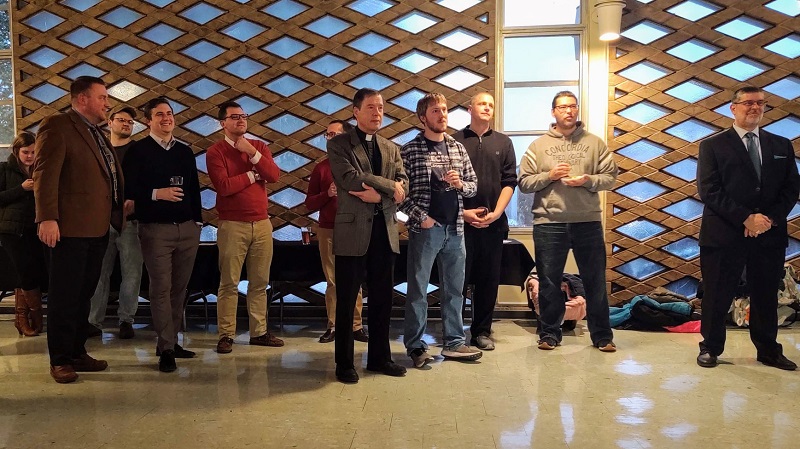
Last Thursday, on November 14, we held the Seminary community’s weekly get-together (called “Gemutlichkeit”) a day early, as many of the students planned to leave for Fall Break as soon as classes finished on Friday. As a part of the last Gemutlichkeit of Fall Quarter, we also held the annual Faculty Author Celebration, sponsored by CPH.
Dr. Ben Mayes, a former editor at CPH before he moved to Fort Wayne in 2016 to serve as Assistant Professor (and now Chairman) of Historical Theology, served as MC for the evening. We recognized 10 faculty members, who were asked to bring their works published within the past 18 months (covering last academic year and the beginning of this year). These books, articles, anthology essays, and pulpit supply resources were displayed on a table in the Student Commons. Chances are a few publications as well as faculty members were missing as the celebration depended on the faculty bringing in their published works, several of whom were not available that evening.
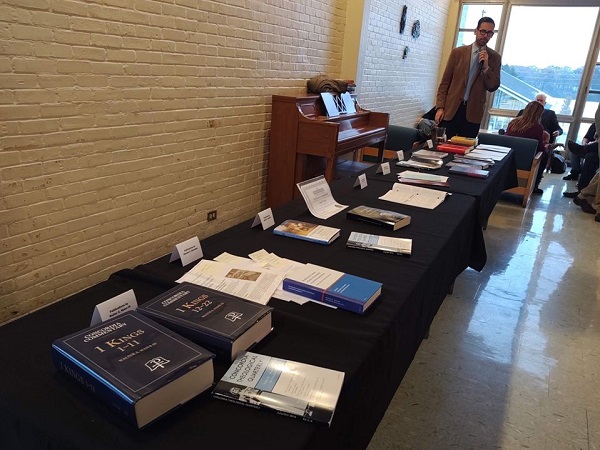
Faculty members recognized included Drs. Gieschen, Grobien, Maier III, Masaki, Mayes, Nordling, Pless, David Scaer, Wiley, and Ziegler. They shared their new works, whether they were published by CPH, us (in the CTQ), or by other publishing houses, covering a wide range of items. For example, Dr. Don Wiley had a couple sermons in one of the Concordia Pulpit Supply publications, one of which had originally been written and preached in Spanish for the installation of a pastor in a Spanish-speaking congregation. Dr. Wiley was called to CTSFW to serve in several different roles, one of which is as Director of the Spanish Language Church Worker Formation Program. A native English speaker, he also brought with him proficiency in Spanish; he’s found that it takes about the same amount of time to write a sermon in Spanish versus translating an old English sermon and editing it to sound natural in the second language. He leads an informal “Spanish over Lunch” class on Fridays at noon in the dining hall for those students interested in learning or improving their skills in Spanish.
Many other works were displayed, from books authored solely by our faculty members to CTQ articles and papers published in larger anthologies. Dr. Ziegler, presenting the large volume in which one of his essays would appear, explained that the book had a dual purpose: as a weapon for self-defense. Dr. Masaki (who has projects not only in America but also in Taiwan and Czech publications) also took a moment to introduce several men from Nigeria and South Africa who are in leadership positions in their church bodies, here to attend a leadership program offered at CTSFW. One such man, the Archbishop of Nigeria, had recently published a work on strengthening integrity in church leadership. “The real leadership is in honesty and integrity,” he explained. Added Dr. Masaki: “His hope should be hoped by every seminarian.”
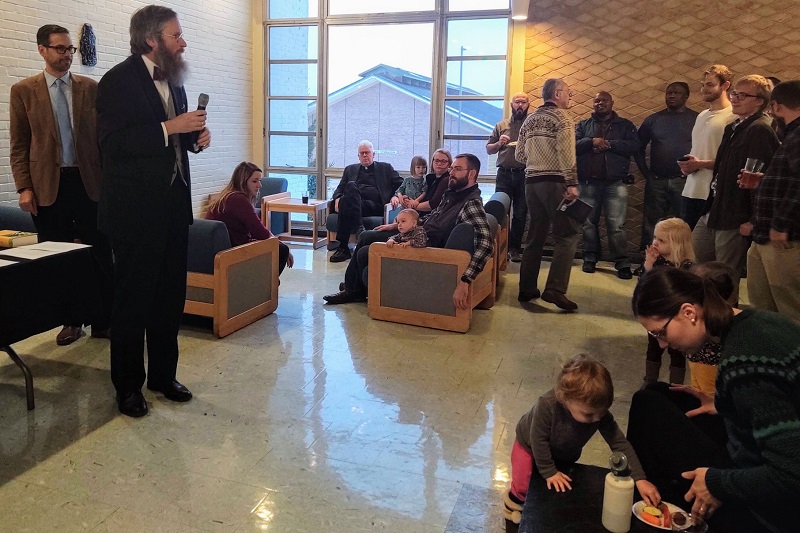
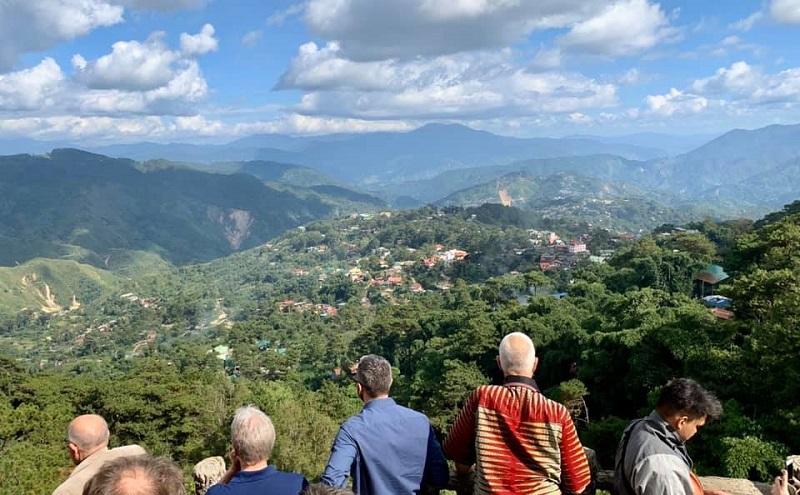
A couple of weeks ago, two of our professors of Systematic Theology, Dr. Naomichi Masaki and Dr. Roland Ziegler, attended the 7th World Seminaries Conference of the International Lutheran Council in Baguio City, Philippines. Dr. Masaki shared greetings on behalf of President Rast and Dr. Ziegler spoke at the conference, expanding on the theme: “Confessional Lutheranism: Doctrinal Identity in Different Cultural Contexts.”
Many different cultural contexts were presented at the conference, as evidenced by the participants and speakers who hailed from many different countries. Besides our own representatives from CTSFW (and a colleague from CSL, Dr. Joel Biermann, who served as a speaker for the North American perspective), the additional cultural contexts were presented by:
During the conference, President Matthew Harrison of the LCMS and President Gijsbertus van Hattem of the Evangelical Lutheran Church in Belgium signed a document finalizing altar and pulpit fellowship between our church bodies. Rev. Dr. Timothy Quill, CTSFW Professor Emeritus, was also appointed as next General Secretary of the ILC.
Dr. Masaki reported that it was a delight to greet the conference hosts. He spoke at the Luther Academy Conference for pastors and church workers at the Lutheran Center in Manial and also served as a guest professor at the Lutheran Theological Seminary & Training Center in Bagui City about a month and a half prior to the conference. Students from the seminary served the conference (you can spot them in the pictures wearing their “uniform” with Luther’s Rose on their jackets), and he was delighted to see them alongside the faculty, pastors, and saints of the Lutheran Church in the Philippines.
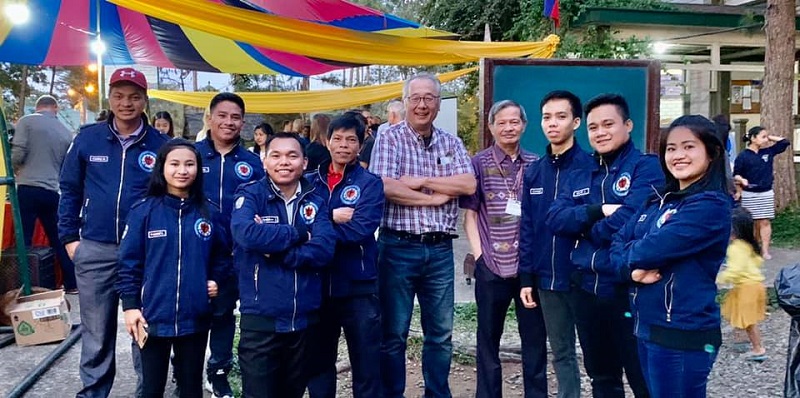
He also shared a story, told by Rev. Jon Albert Saragih of Luther Theological Seminary of Indonesia. In Rev. Saragih’s school days (grade to high school), he learned Japanese, the Bible, and other subjects from Miss Machiko Chigane, a former missionary to Sumatra from West Japan Evangelical Lutheran Church. “Chigane sensei was a member of North Osaka Lutheran Church where I grew up,” Dr. Masaki wrote on his Facebook page, explaining the connection between the two men. “She was an active leader in the congregation. So delighted to hear his story!”
You can read more about the 7th World Seminaries Conference, including details about each of the presentations, at the International Lutheran Council’s website. The articles covering the conference can be found HERE.
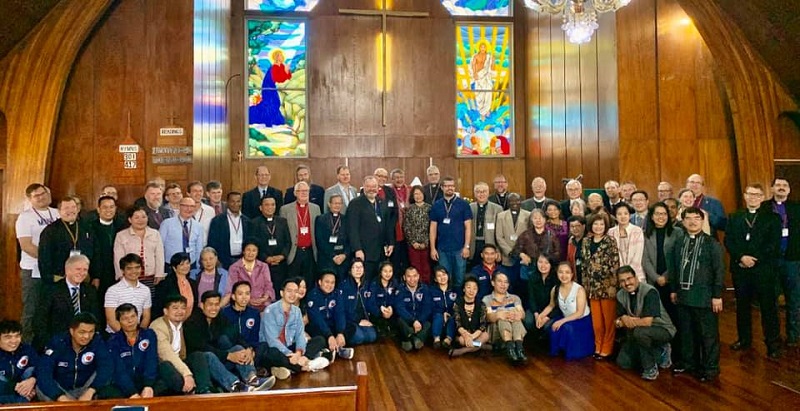
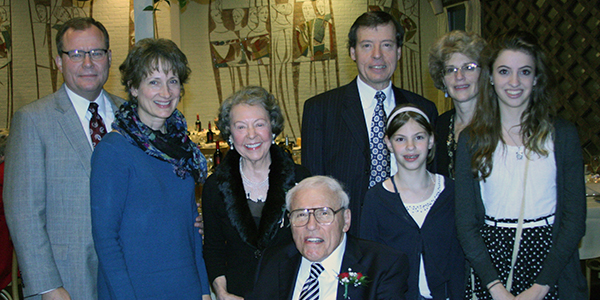
The Rev. Dr. Walter A. Maier II, eldest son of Lutheran Hour founder Dr. Walter A. Maier, entered hospice care early in October, knowing that when he returned home it would not be to his earthly address. While visiting him in hospice on October 8, 2019, President of the Indiana District, the Rev. Dr. Daniel Brege, presented Dr. Maier II with a plaque honoring his 70th anniversary in pastoral ministry. He had originally planned to present it to him at the Indiana District Pastors’ Conference taking place this past week. Instead, at 12:15 p.m. on Thursday, October 24, Dr. Maier II entered through the gates of heaven, called home into the arms of his Savior.
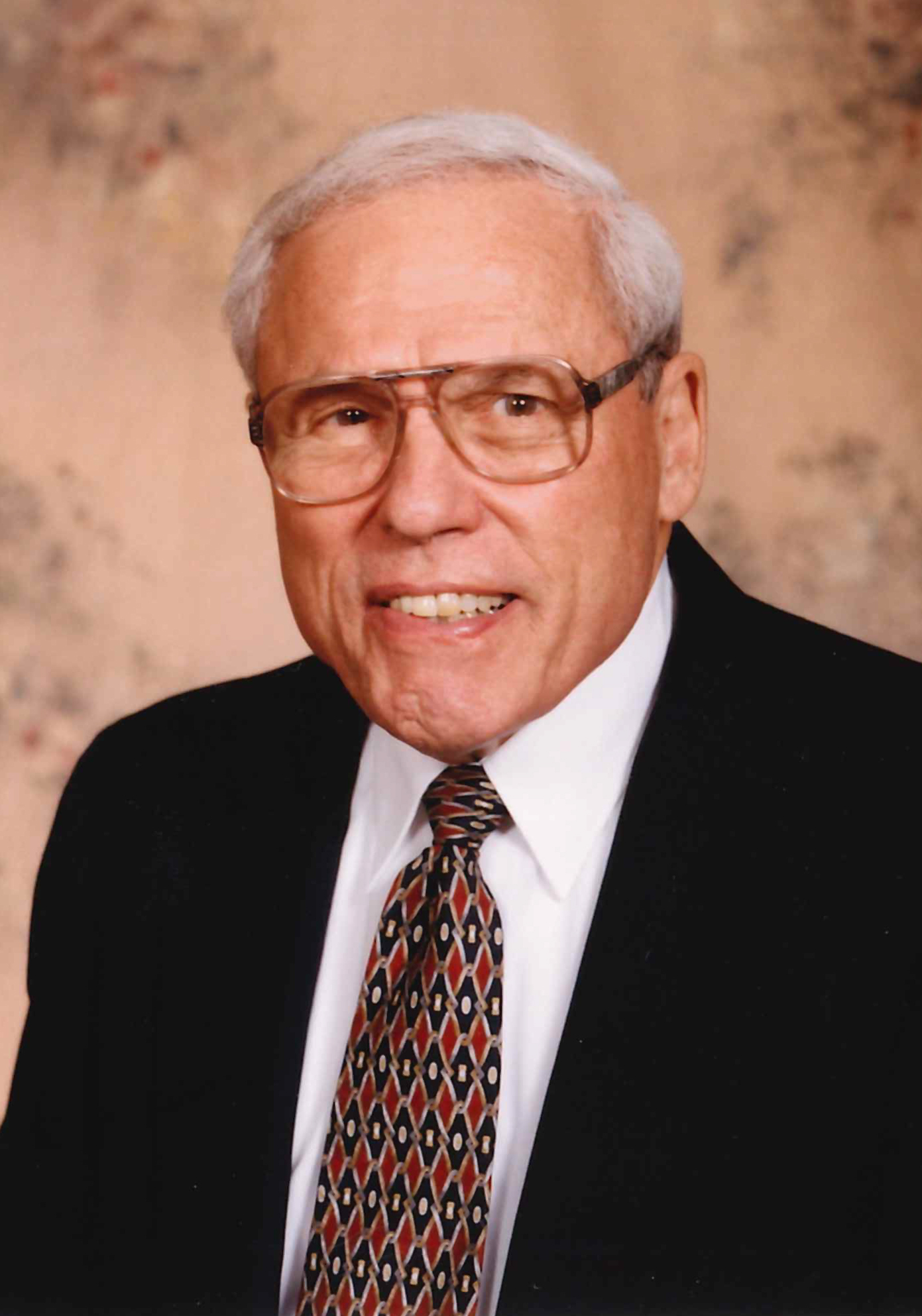 Born on June 24, 1925, Dr. Maier II attended Concordia Seminary, St. Louis, where his father served as a professor, and graduated with a Bachelor of Arts in Exegesis and Systematics in 1948. A year later, he received a Master of Arts in Classical Languages from Washington University in St. Louis. On September 11, 1949, his father ordained and installed him at Faith Lutheran Church, a rural congregation in Elma, New York, where he met his future bride, Leah M. Gach. They were married in 1951 and had two sons, Walter III and David.
Born on June 24, 1925, Dr. Maier II attended Concordia Seminary, St. Louis, where his father served as a professor, and graduated with a Bachelor of Arts in Exegesis and Systematics in 1948. A year later, he received a Master of Arts in Classical Languages from Washington University in St. Louis. On September 11, 1949, his father ordained and installed him at Faith Lutheran Church, a rural congregation in Elma, New York, where he met his future bride, Leah M. Gach. They were married in 1951 and had two sons, Walter III and David.
Dr. Maier II later served a suburban congregation in Levittown, Pennsylvania (Hope Lutheran Church, 1954-1960), then an urban church in Milwaukee, Wisconsin (Hope Lutheran Church, 1961-1965), where he could teach religion and Greek classes at nearby Concordia College. He then accepted a call to Concordia Theological Seminary (CTS), which was located in Springfield, Illinois, at the time. While teaching at the seminary in Springfield, he completed two degrees from the seminary in St. Louis, a Master of Sacred Theology in 1967 and a Doctor of Theology in 1970. Both degrees were earned in Exegetical and Systematic Theology.
Having joined the CTS faculty in 1965 (which would move to Fort Wayne 10 years later, becoming known as CTSFW), he taught New Testament Exegetical Theology full time at the Seminary for the next 35 years, until 2000. For the next 13 years, he taught Greek readings part time, until formally retiring in August of 2013. After his retirement, the Rev. Dr. Charles A. Gieschen, Academic Dean at CTSFW, wrote of his former professor and colleague: “His rapid-fire lecture style, his faithfulness to the biblical text and his attacks on the Historical Critical Method contributed to his popularity as a speaker in the LCMS and his advancement in rank to associate professor (1968) and professor (1973)” (“Dr. Walter A. Maier: A True Servant of God.” For the Life of the World 17, no. 4, December 2013).
Besides his many “spiritual sons” from his 48 years of teaching at CTSFW, Dr. Maier II and Leah’s two sons also followed in their father’s footsteps, studying at the Seminary where their father taught. The Rev. Dr. Walter A. Maier III now serves as Professor of Exegetical Theology at CTSFW and the Rev. Dr. David P.E. Maier is President of the Michigan District. “My father has been a wonderful teacher and example for me all my life,” Dr. Maier III explained to Dr. Gieschen for the 2013 article. “He has shown me what it means to be a father, pastor, professor, scholar and churchman, that is, a true servant of God, one motivated and empowered by Christ.”
Alongside his years in the parish and as a seminary professor, Dr. Maier II served in various positions in the Eastern and South Wisconsin Districts; as Chairman of the Department of Exegetical Theology, Academic Dean, Vice-President, and Director of the Distance Education Program Leading to Ordination(DELTO) at CTSFW; as a vice-president of the LCMS from 1973-1995; and received an honorary Doctor of Humane Letters from Concordia College, Bronxville, New York, in 1999.
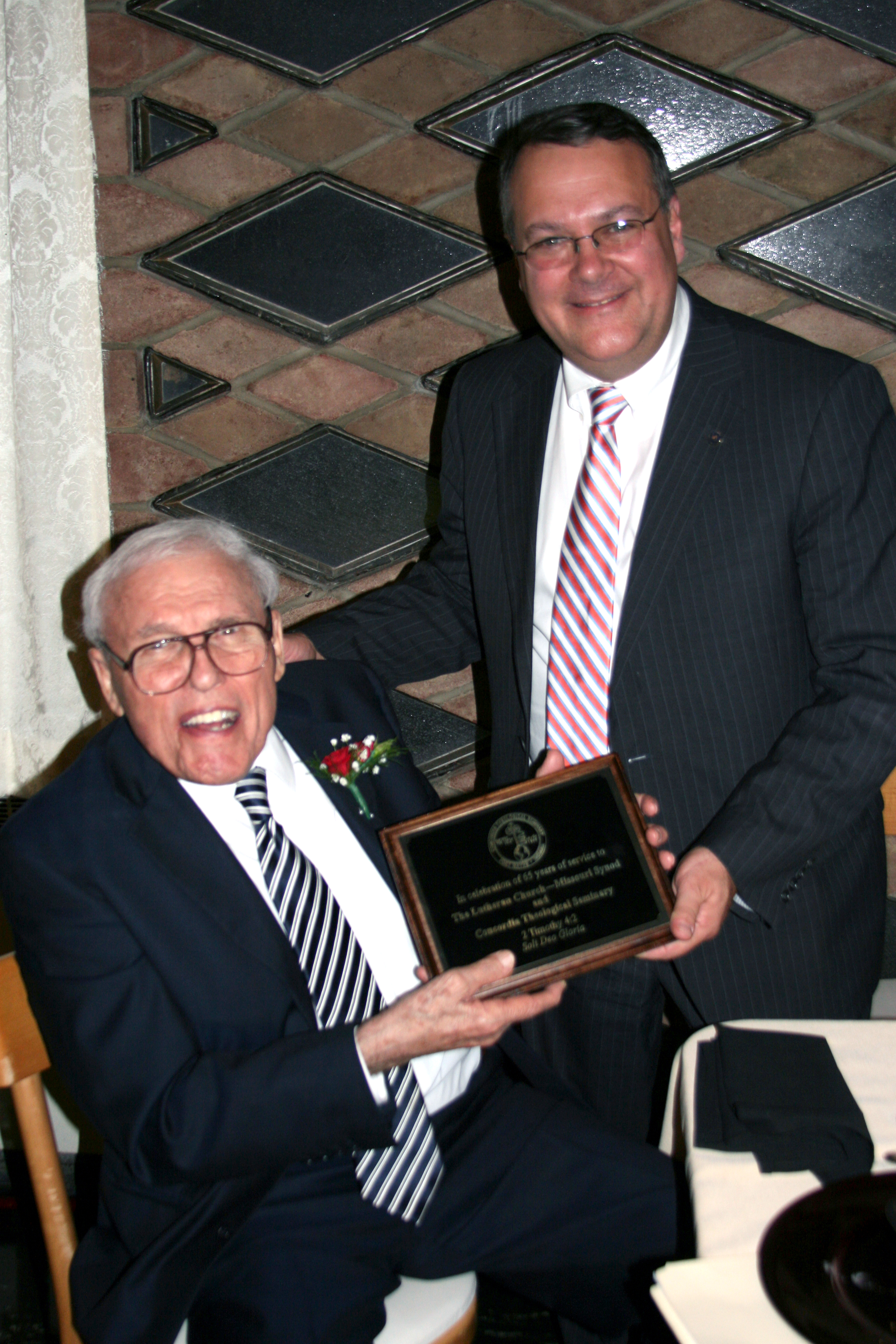 In 1996, while chairing the Seminary’s 150th anniversary committee, Dr. Maier II wrote the following in the January–April Issue of Concordia Theological Quarterly: “From the time the first classes were taught in the parsonage of St. Paul’s Lutheran church in Fort Wayne, in October of 1846, until the present, when the seminary occupies a beautiful campus of two hundred acres near the St. Joseph River, this ‘school of the prophets’ has served as God’s instrument in preparing over four thousand men for the ministerium of The Lutheran Church–Missouri Synod. It has also, through its graduate and extension programs, assisted in the advanced theological education of many pastors through the years. These are great blessings from, and grounds of profound gratitude to, the Lord of the church. These are many reasons for the seminary and the church to rejoice during the current celebratory period.”
In 1996, while chairing the Seminary’s 150th anniversary committee, Dr. Maier II wrote the following in the January–April Issue of Concordia Theological Quarterly: “From the time the first classes were taught in the parsonage of St. Paul’s Lutheran church in Fort Wayne, in October of 1846, until the present, when the seminary occupies a beautiful campus of two hundred acres near the St. Joseph River, this ‘school of the prophets’ has served as God’s instrument in preparing over four thousand men for the ministerium of The Lutheran Church–Missouri Synod. It has also, through its graduate and extension programs, assisted in the advanced theological education of many pastors through the years. These are great blessings from, and grounds of profound gratitude to, the Lord of the church. These are many reasons for the seminary and the church to rejoice during the current celebratory period.”
So, too, we give thanks to God for the great blessings we have received even as we mourn the passing of His servant, Dr. Maier II, while also rejoicing that he has been called home to his eternal rest. “This week, CTSFW and our Synod lost a faithful pastor and vigorous theologian,” said CTSFW President, the Rev. Dr. Lawrence R. Rast, Jr., another former student and colleague of Dr. Maier II. “For seven decades Dr. Maier dedicated himself to the study, teaching, and proclamation of God’s Word. Few are blessed with the length and breadth of service to our Lord demonstrated by Dr. Maier. But even more importantly, the Maier family mourns the loss of a faithful and loving husband, father, grandfather, great-grandfather, and brother. With Advent just around the corner, the entire CTSFW community prays with the Maier family as we all anxiously await our Lord’s coming and that day when we will be reunited with all the saints in heaven.”
Dr. Maier’s funeral will be held at 11:00 a.m. on Thursday, October 31st, at St. Paul Lutheran Church in Fort Wayne (1126 S. Barr St., Fort Wayne, IN 46802). The viewing will be held both the day before at Hockemeyer and Miller Funeral Home from 2:00–4:00 p.m. and 6:00–8:00 p.m. on Wednesday, October 30th, as well as an hour before the service at St. Paul’s on Thursday, October 31st, at 10 a.m.
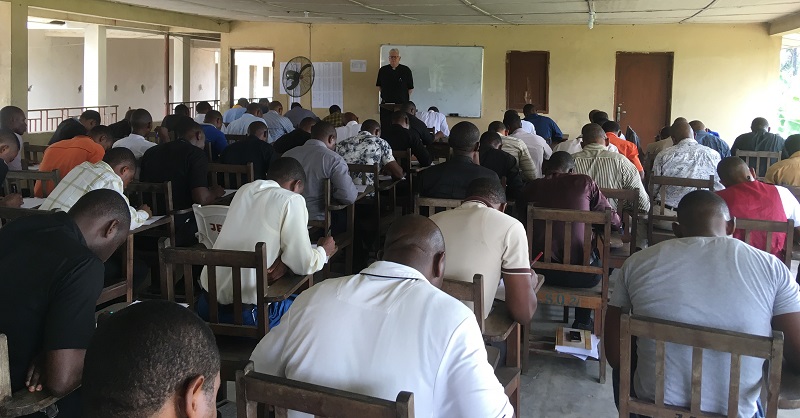
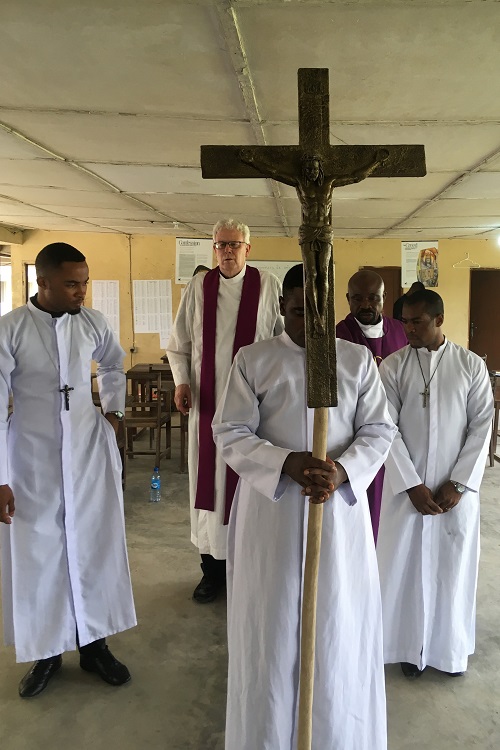
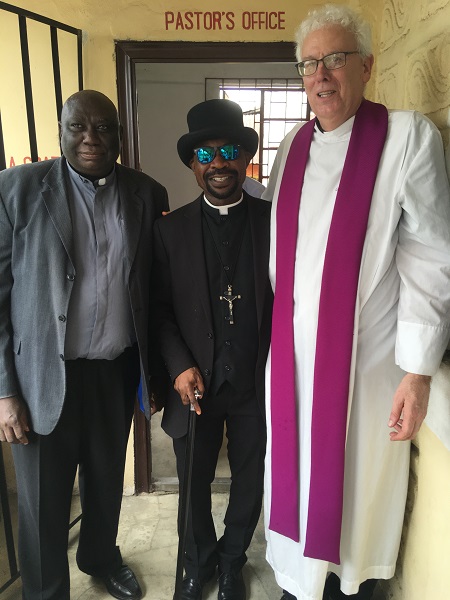
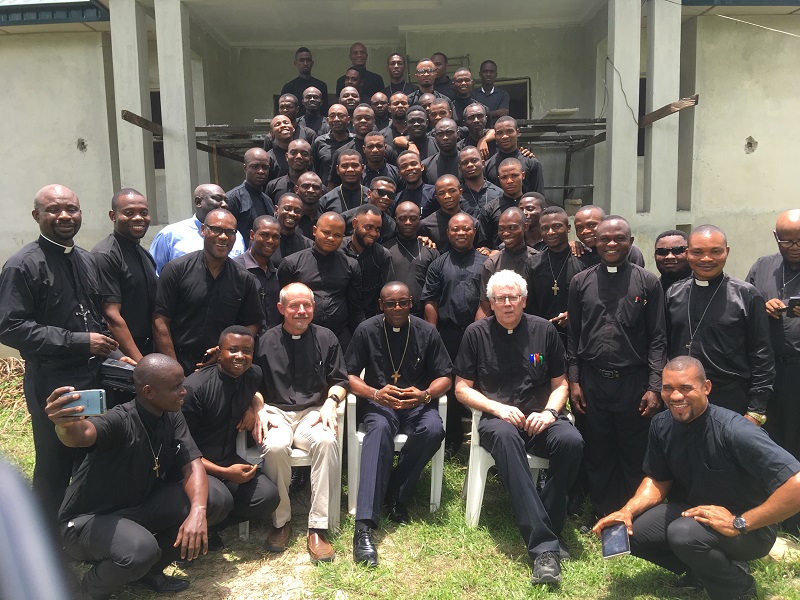
Thanks be to God for His generous gifts, for the confession we share with our brothers and sisters in Christ overseas, for His promises to every nation and generation. May He continue to bless those seminaries built on the rock of His firm and unchangeable Word, as they work in Christ to train pastors to serve as undershepherds for His flock, and deaconesses to serve as His hands of mercy.
While [Jesus] was still speaking to the people, behold, his mother and his brothers stood outside, asking to speak to him. But he replied to the man who told him, “Who is my mother, and who are my brothers?” And stretching out his hand toward his disciples, he said, “Here are my mother and my brothers! For whoever does the will of my Father in heaven is my brother and sister and mother.”
Matthew 12:46-50
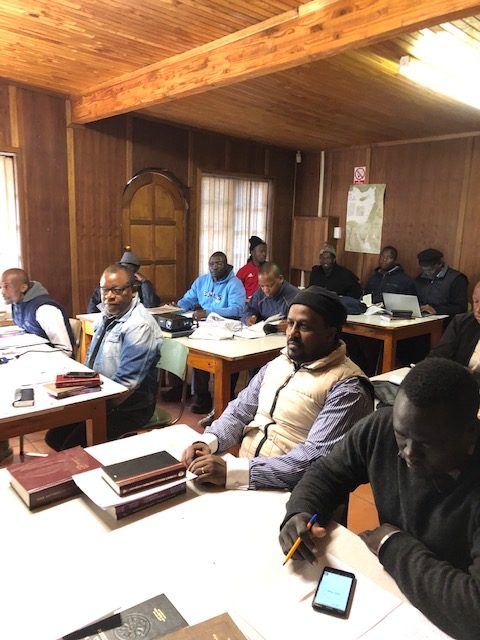 Earlier in the summer, Prof. John Pless (Assistant Professor of Pastoral Ministry and Missions as well as Director of Field Education) was in Tshwane, South Africa, teaching an intensive course at the Lutheran Theological Seminary (LTS). From July 28–August 9 he taught a class of 25 students, finishing out a five course series based on the five volumes of “Commentary on Luther’s Catechisms” by Albrecht Peters. Residential LTS students along with pastors and lay preachers from various South African Lutheran bodies attended the series on how to teach, preach, and provide pastoral care based on each section of the Lutheran Confessions.
Earlier in the summer, Prof. John Pless (Assistant Professor of Pastoral Ministry and Missions as well as Director of Field Education) was in Tshwane, South Africa, teaching an intensive course at the Lutheran Theological Seminary (LTS). From July 28–August 9 he taught a class of 25 students, finishing out a five course series based on the five volumes of “Commentary on Luther’s Catechisms” by Albrecht Peters. Residential LTS students along with pastors and lay preachers from various South African Lutheran bodies attended the series on how to teach, preach, and provide pastoral care based on each section of the Lutheran Confessions.
He first began teaching this advanced catechetics series in February and March of 2017. “I appreciate the continuity I have with these students,” Prof. Pless wrote in a report following the final class. “It is especially heartening to have a solid core group of pastors and lay preachers who return for each offering.”
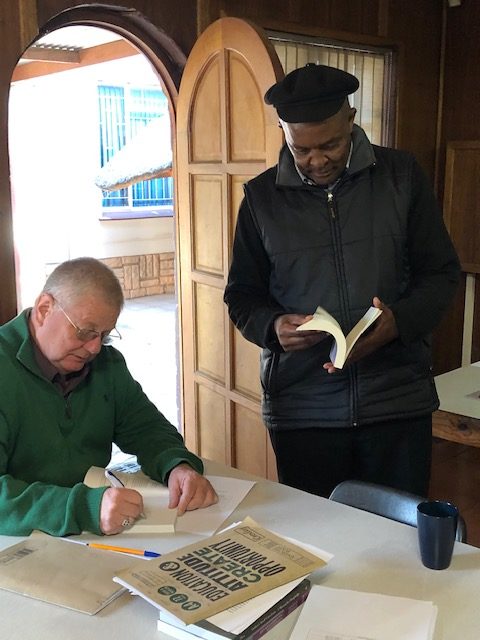 For three hours each morning, Prof. Pless covered the fifth volume of Peters’ commentary, teaching about Confession and Absolution as well as the daily prayers and the table of duties in the Small Catechism. He used his newest book, “Luther’s Small Catechism: A Manual for Discipleship,” as a supplement. Donors from the United States provided both books for the students.
For three hours each morning, Prof. Pless covered the fifth volume of Peters’ commentary, teaching about Confession and Absolution as well as the daily prayers and the table of duties in the Small Catechism. He used his newest book, “Luther’s Small Catechism: A Manual for Discipleship,” as a supplement. Donors from the United States provided both books for the students.
In addition to teaching, preaching in chapel, and visiting colleagues and local pastors, Prof Pless noted a particular undertaking nearing completion at LTS. “Certainly a highlight of this trip was to watch the daily progress being made on the library expansion and renovation, a project supported by the St. Philip Lutheran Mission Society.” The St. Philip Lutheran Mission Society is made up of CTSFW alumni, who first visited LTS in the spring of 2008 as students. Now pastors, they raise financial aid for the institute to support the promotion of confessional Lutheran theological education in Africa through LTS.
“It is such a blessing to be able to partner with LTS-Tshwane on this project,” explained the chairman of the society, Rev. Chris Maronde, associate pastor at St. John in Decatur, Indiana, and doctoral student at CTSFW. “The express mission of the Saint Philip Lutheran Mission Society has been to support the seminary in any way we can, although this is the first capital project we have ever undertaken.
“As Philip didn’t travel to Africa but sent the Ethiopian back to his home, so Saint Philip Lutheran Mission Society is made up of pastors (all CTSFW alums) and donors in the United States who support the training of native pastors, who will travel back to their homes all over Africa with the saving proclamation of Christ and Him crucified.
“Our primary method of aid is tuition support, but it has been very satisfying to see a ‘brick and mortar’ project travel from conception and fundraising to construction. It is also humbling to the board to see this mission society, still very young, be the driving force in the construction of a building thousands of miles away.”
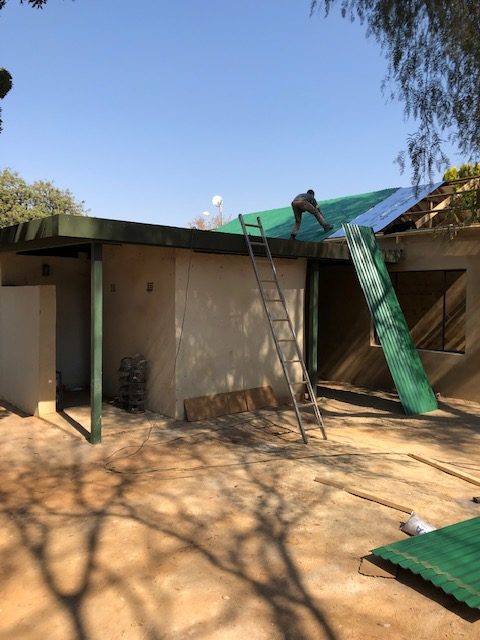
Many challenges delayed the project for several years, but construction finally began in the spring; the dedication is scheduled for September 7, two days from now. The expansion of the facility had been overdue for many years, and will more than double the space for holdings, allowing many books to be brought out of storage and into student’s hands. The previous rector of the seminary, Dr. Weber, asked the society to take on the project, and the current rector, Dr. Winterle, saw it through to construction. “We enlisted the help of many in the United States,” Rev. Maronde went on, “particularly by partnering with the Rocky Mountain District of the LCMS (who is providing funding to equip the building with necessary amenities), and a grant from a Lutheran organization in Texas. Without our own donors and these other organizations, this library would not be under construction.”
Prof. Pless plans to return to LTS in March of 2020 to teach “The Psalms in Pastoral Theology,” followed by another Confessions course in August. “I am grateful to the congregations and individuals whose gifts have enabled me to travel to South Africa and bring books for our students,” he noted in his report. “As long as we can find funding for these trips, I am willing and eager to come to South Africa twice a year.”
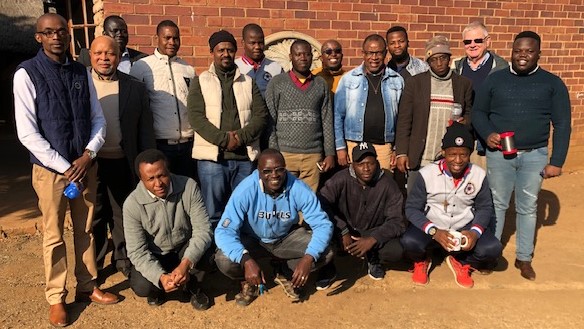
You can learn more about the St. Philip Mission Society at www.splms.org. To learn more about the seminary in Tshwane, go to www.lts.ac.za.